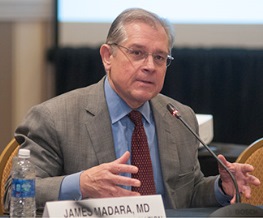If you could scrap the current health care system and start from scratch, what would it look like? The AMA’s work in its three strategic focus areas are building blocks toward a better health care system, said AMA CEO and Executive Vice President James L. Madara, MD, Thursday during a capstone panel hosted by The Atlantic.
Dr. Madara (pictured left) joined Sam Nussbaum, MD, chief medical officer for WellPoint, and Kavita Patel, MD, managing director for the Brookings Institution Engelberg Center for Health Care Reform, to discuss the changing health care system during The Atlantic’s Health Care Forum in Washington, D.C. The three panelists discussed health insurance, electronic health records (EHR) and other challenges that may be keeping physicians from providing high-quality patient care.
During the panel, Dr. Madara said there is a “broad recognition that the status quo trajectory” of the current state of health care isn’t working.
We have begun “an irreversible march toward a better future,” he said. “We have to recognize the size and complexity of the health care system in the United States. If you broke it off and floated it in the ocean, it would be the fifth largest economy in the world.”
The AMA’s march is through its three strategic focus areas: improving health outcomes in the context of chronic disease, focusing on educating physicians in new ways and stabilizing physician practices.
The panelists directed attention toward physician satisfaction and growing concerns about being overworked or burned out. Dr. Nussbaum posed an important question: “How do we help physicians have a better life so they will continue to practice and spend more time with patients?”
“Physicians feel like they are becoming typists,” Dr. Madara said.
Dr. Patel said she and her colleagues felt like they were suffering from “inbox fatigue.”
“We have so much coming at us,” she said. “We’re on the [EHR software] late at night saying, ‘Is this really what we signed up for?’”
To that end, the AMA is developing strategies and tools to ease EHR adoption for physicians along with other resources to enhance practice sustainability and physician satisfaction. This work—combined with getting in front of chronic diseases like heart disease and type 2 diabetes and training physicians of the future to be better prepared for the changing medical landscape—will help the AMA shape a better health care system.




